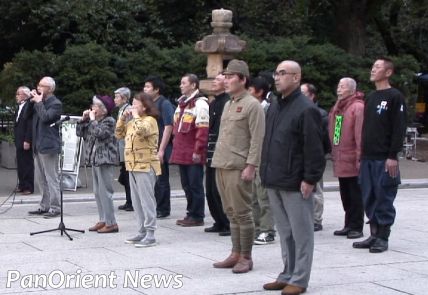|
|
Politics
Japanese Nationalists Reject Separation of Class-A War Criminals from Yasukuni
Thursday, November 27, 2014

Tokyo - (PanOrient News) Japanese nationalists have rejected a resolution by the Japan War-bereaved Association's Fukuoka branch to remove 14 Class-A war criminals from Yasukuni Shrine, saying that classification as an A- or B-class war criminal should not apply when they are dead.
Hidetoshi Tsuruoka, leader of a Japanese right-wing organization called Kensei Sekishin Juku told PanOrient News, "I believe it is Japanese people's responsibility to pray for those who sacrificed their lives for our country. Although I am 81 years old, I still come to Yasukuni often to show my true appreciation and respect to such souls. Therefore, I cannot accept the proposal for separating those called Class-A war criminals."
The so-called 14 Class-A war criminals, including Hideki Tojo, the Prime Minister of Japan during World War II, are enshrined at Yasukuni Shrine, along with nearly 2.5 million soldiers.
"Yasukuni is where those heroes, who sacrificed their lives for their country, are enshrined and I believe those Class-A criminals were categorized as such by the allied forces led by the United States," Tsuruoka said. He argued, "When soldiers die, I don't think whether he was an A-class or B-class war criminal matters. They are all those who sacrificed their lives for their country. Even when regular criminals die, what they did in this world does not matter. So it is unreasonable to categorize some who died for their country as A-class war criminals. They were named as A-class war criminals by those on the prosecution side. That is not fair, and that is not something I can accept."
Opinions on the shrine are divided in and outside Japan. While some visit Yasukuni Shrine simply to pray for those who died in war, others, especially neighboring countries such as China and Korea, see it as a tribute to Japan's militaristic past.
"A lot of my classmates became soldiers and died. That’s why I come here every Sunday and play my harmonica – to pray for those war heroes," said Hideko Fujimori, an 86 year-old lady who was among a group of nationalists gathering at a food outlet at the shrine. Before leaving, they stood facing the shrine and sing a nationalistic song before bowing toward the shrine, representing their deep attachment to this site.
On the other hand, Keiji Kakuta, a Lower House member from the Japan Communist Party, thinks that enshrining those "Class-A war criminals" in Yasukuni in1978, along with those died in war, "was the wrong idea in the first place".
"Yasukuni is a shrine that justifies what Japan did during WWII. Thus, we emotionally understand why members of the War-Bereaved Association in Fukuoka adopted such a resolution because they believe such war must not be repeated," Kakuta told PanOrient News.
However, he added whether removing "A-class war criminals" or not, is not the most important issue. "Yasukuni Shrine is a place which promotes and justifies Japan's involvement in the WWII. That is why it states there were no “war criminals.” As long as Yasukuni does not change such a stance, the issue of keeping or removing A-class war criminals is just the tip of the iceberg of the whole issue."
Still a Living History
The origin of Yasukuni Shrine is Shokonsha established at Kudan in Tokyo in the second year of the Meiji era (1869) by the will of the Emperor Meiji. In 1879, it was renamed Yasukuni Shrine.
According to the records of Yasukuni, the origin of Yasukuni Shrine is Shokonsha established at Kudan in Tokyo in the second year of the Meiji era (1869) by the will of the Emperor Meiji. In 1879, it was renamed Yasukuni Shrine.
When the Emperor Meiji visited Tokyo Shokonsha for the first time on January 27 in 1874, he composed a poem; "I assure those of you who fought and died for your country that your names will live forever at this shrine in Musashino". As can be seen in this poem, Yasukuni Shrine was established to commemorate and honor the achievement of those who dedicated their precious lives for their country. The name "Yasukuni," given by the Emperor Meiji represents wishes for preserving peace of the nation.
The records also say that currently, more than 2,466,000 divinities are enshrined here at Yasukuni Shrine. These are souls of men who made ultimate sacrifice for their nation since 1853 during national crisis such as the Boshin War, the Seinan War, the Sino-Japanese and Russo-Japanese wars, World War I, the Manchurian Incident, the China Incident and the Greater East Asian War (World War II). These people, regardless of their rank or social standing, are considered to be completely equal and worshipped as venerable divinities of Yasukuni".
PanOrient News
© PanOrient News All Rights Reserved.
|
|

